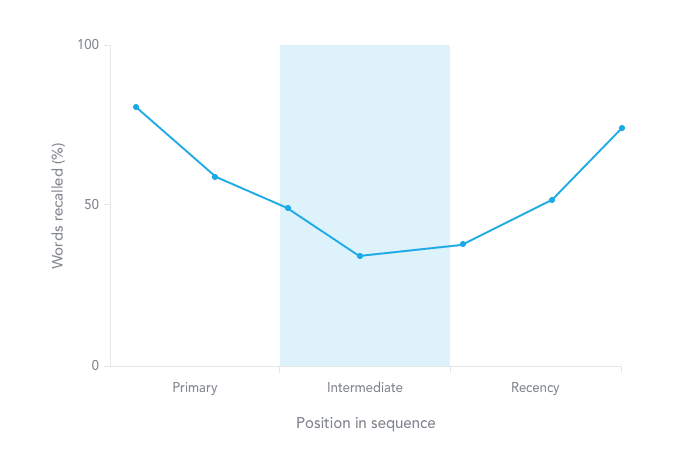

The last few things that a person hears are remembered more than what was said before. The last few pieces of information that a person has just learned take priority in their brain when trying to remember something.

We tend to focus on the end of something and ignore the middle details. Humans are very susceptible to recency effects.

#SERIAL POSITION EFFECT SERIAL#
The following are reasons why the serial position effect occurs Why Does the Serial Position Effect Happen? However, this model proposes that recency effects result from a short-term memory system and primacy effects result from a long-term memory system. This model suggests that different mechanisms from the single-store model cause recency and primacy effects. A buffer zone separates the two stores to prevent information from one store from affecting the other. One store covers items near the beginning of a list, while the other deals with items near the end of the list. The Dual-store model proposes that recency effects result from a single memory store while primacy effects result from a separate memory store.Īccording to the dual-store model, information is encoded into two separate stores. This model suggests that different mechanisms cause both recency and primacy effects. This model suggests that these effects are caused by the memory trace of the most recently presented list items (i.e., recency effect).Īccording to the single-store model, items that are recently presented to memory but not tested until after a retention interval of sufficient duration (e.g., over 24 hours) will be remembered accurately. This model indicates that serial position effects are a result of a single mechanism. There are three models involved in the recency effect, namely single-store, dual-store, and ratio rule. It occurs because the brain will focus on what it has just learned instead of older information. This bias is when the person remembers the last few words or pieces of material most. The recency effect is most applicable when the subject has not learned the material before. This bias is most applicable when the subject has learned the material before but forgets everything they have learned. They will place those pieces of information well even if they don’t review them. The Primacy EffectĪ person experiencing this effect will remember the first few words or things that they learn the most. You would probably remember those two because they were drawn first and last. You would most likely answer correctly with 2 and 4. For example: if someone were to show you four drawings and then ask you what was drawn second and fourth from the left (without showing them again). This effect can happen when we study material such as words, numbers, or pictures one at a time. The first item on the list, or “primacy effect,” is more likely to be recalled than any other item this may also apply for the last few items of the list, or “recency effects.” The serial position effect is a phenomenon in which people best remember the first and the last items on a list and remember the middle items worst.


 0 kommentar(er)
0 kommentar(er)
